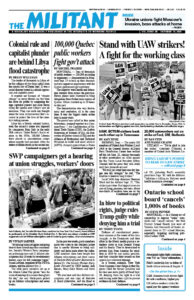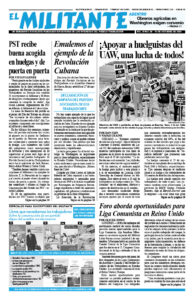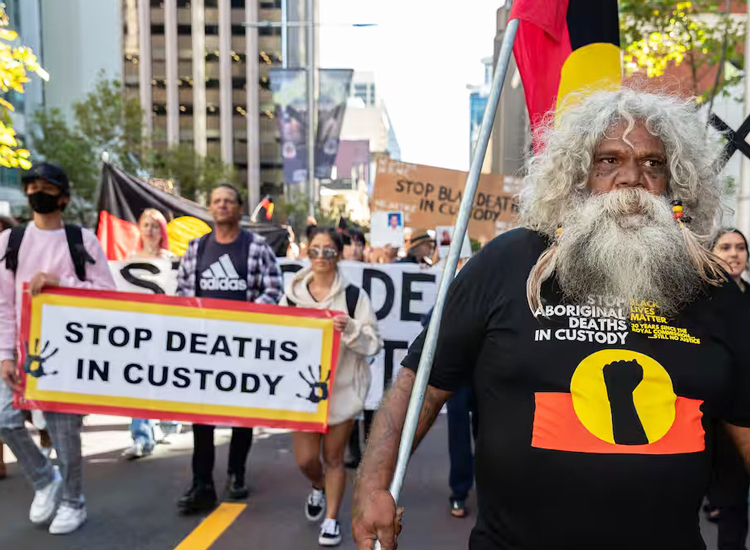SYDNEY — Working people here will vote in a referendum Oct. 14 on whether to change the Constitution to “recognize” the original inhabitants of the country by creating an Aboriginal and Torres Strait Islander “Voice” to act as an advisory body to the Australian Parliament.
Since his election in May 2022, Labor Party Prime Minister Anthony Albanese has pushed this measure, ostensibly as a way to deal with over 200 years of oppression of Aboriginal people. Its goal is to improve the image of the Australian rulers, at a time when they are seeking to play a more decisive role in the Pacific-Asia region.
He has drawn on support from top trade union officials, prominent Aboriginal figures, major sporting organizations and big business. Qantas, Rio Tinto, BHP and Wesfarmers are among major Australian capitalist corporations that have given public support and millions of dollars to the Yes campaign.
Albanese called the vote “a once-in-a-generation chance to bring our country together and to change it for the better.” But as the economic crisis deepens across Australia, many workers are wary of this campaign that is being led by the bosses and their government. A debate has widened on the issue, including among Aboriginal leaders.
At a Militant Labour Forum held here Sept. 30, Robert Aiken, a leader of the Communist League, said, “We call for a No vote in the referendum.” He said, “Establishing a ‘Voice’ to advise Parliament will only serve to derail the struggle for Aboriginal rights. It counterposes reliance on such institutions to independent working-class political action.”
Aiken explained what is needed is not a referendum, but a union-led fight for jobs, housing and health care to address the economic and social crises that bear down hardest on Aboriginal people. “The fight for the liberation of Australia’s indigenous people is an essential part of the working-class road to power.”
Proposal is a diversion
The request for the “Voice” came out of a government-initiated meeting of Aboriginal leaders in 2017. It called for “the establishment of a First Nations Voice enshrined in the Constitution.”
The proposed body would only advise the government on Aboriginal affairs, without having any decision-making powers. Its composition would be decided after the referendum.
The Yes campaign claims to stand on the successful 1967 referendum, when a decadelong campaign by Aboriginal people won a change to the Constitution to recognize all Aborigines as equal citizens.
Unlike the bipartisan support for the 1967 change, the Labor proposal has sparked a sharp debate in bourgeois politics. Peter Dutton, leader of the opposition Liberals, has called for a No vote. He says the debate around the referendum is dividing Australia.
Marcia Langton, an Aboriginal academic who is one of the architects of the proposal, sparked an uproar Sept. 12 by saying the arguments of the No campaign were “base racism” or “sheer stupidity.” The race-baiting tone of some of the middle-class Yes campaigners portrays working people as backward and the source of racism.
Two Aboriginal leaders, Jacinta Price, a Country Liberal Party senator from the Northern Territory, and businessman Warren Mundine, have been the most prominent spokespeople for the No vote.
Mundine claims that the Voice will be just another bureaucratic structure that further entrenches government in Aboriginal lives. “Aboriginal people are the most over-governed people in Australia. We need less government, not more,” he said.
Addressing the National Press Club, Price told reporters, “If we keep telling Aboriginal people that they are victims, we are … giving them the expectation somebody else is responsible for their lives.”
Aboriginal families face far higher unemployment, as well as crisis conditions in housing, health care and education. Conditions are even worse in remote communities. Indigenous youth face disproportionately high rates of arrest and imprisonment.
Life expectancy for Aboriginal and Torres Strait Islanders remains up to 14 years lower than for other Australians. Babies born to Aboriginal mothers die at twice the rate of others. Aboriginal and Torres Strait Islander people also face substantially higher rates of heart and kidney disease, as well as diabetes.
Spurred by victorious civil rights battles in the U.S. in the 1960s, an Aboriginal-led movement won wide support for land rights, against segregation in townships and racism in hiring.
A broadening fight in the 1980s against Aboriginal deaths in the hands of the police and prisons was demobilized by the establishment of a special government investigation, a Royal Commission on Aboriginal Deaths in Custody. After years of court hearings and taking evidence, its recommendations were mostly ignored. Today indigenous people are six times more likely to die in prison than other Australians.
At a Sept. 24 meeting here, titled “Yes or No, what is next?” a panel of Aboriginal activists spoke about why they were not endorsing the Yes campaign. The event publicized a national day of action Oct. 7 to protest Black deaths in custody.


